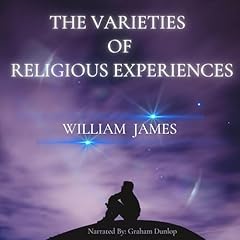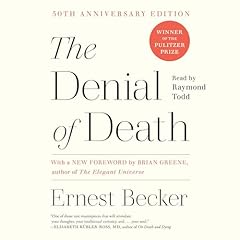
The Varieties of Religious Experience
No se pudo agregar al carrito
Add to Cart failed.
Error al Agregar a Lista de Deseos.
Error al eliminar de la lista de deseos.
Error al añadir a tu biblioteca
Error al seguir el podcast
Error al dejar de seguir el podcast
 Exclusivo para miembros Prime: ¿Nuevo en Audible? Obtén 2 audiolibros gratis con tu prueba.
Exclusivo para miembros Prime: ¿Nuevo en Audible? Obtén 2 audiolibros gratis con tu prueba.Compra ahora por $25.51
-
Narrado por:
-
Jim Killavey
-
De:
-
William James
Psychologist and philosopher William James (brother of Henry) is regarded by most psychologists of religion as the founder of the field. He was president of the American Psychological Association and wrote one of the first psychology textbooks. In the psychology of religion, James' influence endures to this day.
The Varieties of Religious Experience is considered to be the classic work in the field. To quote Wikipedia, "James was most interested in understanding personal religious experience. The importance of James to the psychology of religion - and to psychology more generally - is difficult to overstate. He discussed many essential issues that remain of vital concern today. What makes James writing so special is that he could take a very complex subject and, without watering it down, make it understandable to 'the rest of us.'"
This is a must listen for anyone interested in religon and man's search for the spritual. It is written for laymen, thus easy to understand, but remains penetrating and brilliant.
Public Domain (P)2009 Jimcin RecordingsLos oyentes también disfrutaron:




















Reseñas de la Crítica
"Believers and unbelievers (and semi-believers) will continue to find in it both a resource and a challenge. Quaint though some of it may seem at first in language and approach, The Varities of Religious Experience, can itself become for the contemporary reader not only an intellectual exercise but a religious experience." (Jaroslav Jan Pelikan, Sterling Professor of History Emeritus, Yale University)
Las personas que vieron esto también vieron:


















Great ideas...
Se ha producido un error. Vuelve a intentarlo dentro de unos minutos.
Religious Wisdom incarnate
Se ha producido un error. Vuelve a intentarlo dentro de unos minutos.
New line this is probably one of the most important documents and Revelations and modern Western learning. This is an empirical psychologist writing about how religion makes sense, not trying to convince anyone how to believe or what to believe, but rather there are statements about religion that can be proven Beyond academic dispute.
New line one of the most important statements he makes is that knowledge of a thing is not the thing itself. He explains why most religions have their own views of the nature of the godhead and the universe and the more, and even though participants in those religions might not agree with each other, there are common threads that do agree with each other.
New line for me this is important because later came Joseph Campbell professor of mythology who looked to see what religion and myths had in common rather than in contrast, the new thought movement which for me was spearheaded by dr. Emmet Fox providing a simplified plain English 1937 any seven-year-old can understand it Rosetta Stone for Spiritual reading and understanding. Last week, several of the important non-sectarian non denominational groups of the early 20th century either new of this work or took parts right from it semicolon I happen to be referring specifically to they will have the paper William Foster Wilson, Chief author of one of the most important how-to books of the 20th century, the main text about Go Alex anonymous. The varieties of religious experience is referred to explicitly in several places, especially regarding conversion. Version is when the low activities of Life are somehow mysteriously withdrawn and placed with a higher level of understanding. You have to hear the whole thing in order to understand the how and why.
New line My only criticism is that while the vocabulary is not so lofty, the grammatical and some tactical structures can be, and the narrator makes what I'm aware of as Evers semicolon not important enough to be comical. Just enough to let you know that you're paying attention.
New line Thank You Professor James for having given these lectures. By the way the paper book is in the public domain and I recently gave away several copies. They can also be found on PDF, searchable. Good luck
puts a whole different spin on the idea of religio
Se ha producido un error. Vuelve a intentarlo dentro de unos minutos.
Always wanted to read this, and very worth the effort.
Se ha producido un error. Vuelve a intentarlo dentro de unos minutos.
Profound stuff
Se ha producido un error. Vuelve a intentarlo dentro de unos minutos.


